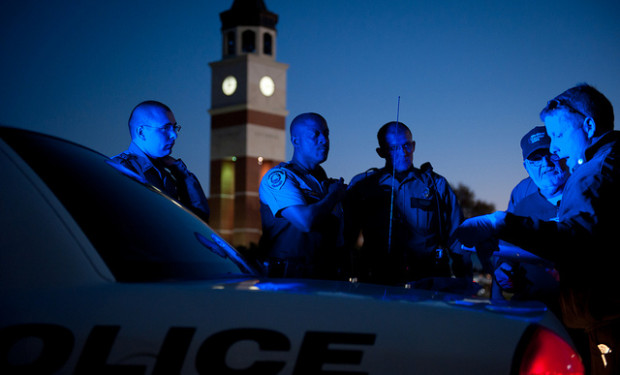Accusations of racial profiling cause tension on college campuses
Colleges struggle to strike a balance between respecting students' rights and helping campus police departments do their job.
This article is the first in a three-part series on allegations of racial profiling by college police departments. This week’s installment focuses on recent conflicts with campus police.
With the nation’s focus on the killings of unarmed black men in Ferguson, Missouri and New York, college campuses have become hotbeds of protests against racial profiling and use of excessive force by police. Several colleges’ police forces have become the subject of recent controversies stemming from allegations that they had engaged in racial profiling.
University of Pennsylvania
University of Pennsylvania President, Amy Gutmann, has faced widespread criticism after participating in a “die-in” protest held by students. Similar demonstrations have become popular around the country to symbolize the four and a half hours the body of Michael Brown, the black teenager killed by a police officer in Ferguson, remained in the street after being shot.
Gutmann has received particular criticism from the president of the Penn Police Association, Eric J. Rohrback, for her actions as president of the university. In a letter published by The Daily Pennsylvanian, the student newspaper, Mr. Rohrback said Ms. Gutmann had delivered “a slap in the face to every person that wears this uniform and serves this university.”
The university’s administration attempted to mend relations with its campus police officers, by releasing a statement that Gutmann is supportive of the officers and police in general.
University of Minnesota
The University of Minnesota’s Black Faculty and Staff Association, joined by the departments of African-American and African studies and other student groups, sent a letter to the university’s president Eric W. Kaler demanding that the campus police stop routinely publishing the race of suspects in campus crime alerts. The letter stated that the alerts had led to a rise in racial profiling on campus and should either be stopped or supported with a strong justification.
University administrators made the decision to stand behind the university police department and refused the demands from faculty, staff and student organizations.
Vassar College
Campus police officers of Vassar College were accused of racial profiling in two incidents. The allegations arose after officers confronted two black female students using a dorm laundry room. The college’s officers also called the town police on a group of black teenagers for being noisy in the library.
Vassar College announced that it would attempt to deal with the problem by amending its anti-discrimination policies to explicitly prohibit racial profiling and hiring a consultant firm to review current campus security practices.
Wake Forest University
Students of Wake Forest University held a town-hall meeting to discuss growing tension between students and Wake Forest Police. The tension stems from black students’ perceptions that the campus police ask for their identification more than other students and give disproportionate scrutiny to social functions held by black fraternities and sororities.
The university’s police chief, Regina Lawson, told students at the meeting that her department had established a bias reporting system and plans to train officers to avoid future discrimination.
Looking for a Solution
College and university administrators face the challenge of responding and attempting to rectify issues of racial profiling. The challenge lies in respecting the rights of students while avoiding alienating the officers they depend upon to maintain order on campus.






